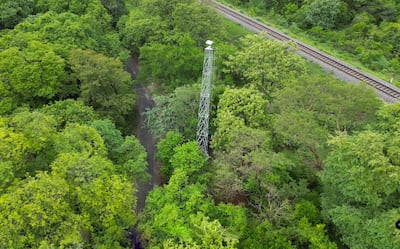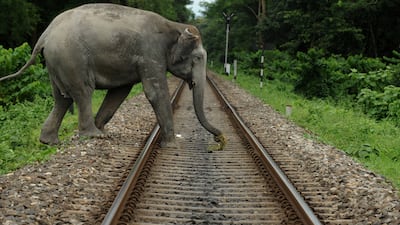In 2021, three female elephants were killed by a train near the Madukkarai forest range in India’s southern Tamil Nadu state.
The deaths of the endangered animals on railway tracks shook network officials and conservationists.
Three years later, a monitoring system using artificial intelligence has prevented more than 1,100 rail mishaps and saved the lives of hundreds of elephants.
Authorities in Tamil Nadu have set up 12 towers with AI-enabled cameras near the railway tracks in the Madukkarai range in the state’s Coimbatore forest division, on the border with Kerala.
The elephants often migrate from one state to another through the forest along the Walayar river but are in danger from trains that run on two parallel tracks.
The AI cameras, however, have significantly reduced such incidents on what are the busiest railway lines in Tamil Nadu.

The camera software is designed to detect elephants within 150 metres of the track and send alerts to forest and railway officials, who slow the trains down and guide any elephants out of harm's way.
“This stretch is a high-intensity railway traffic area, close to 300 trains pass each day. Secondly, it cuts across a vital track that elephants regularly cross over to reach water,” Srinivas Reddy, principal chief conservator of forests, Tamil Nadu, told The National.
“This railway line stretch is about 13km long in Tamil Nadu and 20km in Kerala. We have covered 9km of the most vulnerable part with AI cameras.”
India is home to the world’s largest population of Asian elephants, an endangered species.
There are nearly 30,000 in the wild in India, according to the last census, conducted in 2017.
About 3,000 wild elephants live in the dense jungles of Tamil Nadu, including about 190 in Coimbatore’s forested area and more than 2,000 in Kerala.

About 200 elephants were killed in train collisions – the second-highest cause of unnatural deaths of the animals in India – in the past 10 years.
Forty-five elephants were killed in train accidents between 2019 and 2021, Railway Minister Ashwini Vaishnaw told parliament last year.
As many as 11 elephants have died in collisions with trains since 2008 at Madukkarai forest range, the state government said.
This included the three females – one adult, one sub-adult and a juvenile – who were run over by a train in 2021, prompting authorities to look for safety solutions.
Although forest staff worked day and night to watch the elephants and underpasses were built under the tracks for them, accidents continued to happen.
“This was a major incident and that is how the idea of having AI projects where we can monitor the elephants came,” Mr Jayaraj, divisional forest officer, Coimbatore, who looks after the project, told The National.
The Tamil Nadu government started working on the project in 2022 at a cost of 72 million rupees, about $860,000.

It was launched in February this year and since then, authorities have succeeded in averting 1,100 incidents and saving lives of the elephants, Mr Jayaraj said.
Authorities have installed towers, five on Track A and seven on Track B, at a distance of 500m each, fitted with 360º AI cameras, thermal night vision and daylight capabilities.
“The animals cross the area during rainy and summer seasons. These cameras cover vulnerable areas up to 7km into the forest from the railway tracks. It gives an alarm to the control room,” Mr Jayaraj said.
“People work in three shifts at these control rooms. Alarm messages are generated and sent to the track officials, who have 24 people in five teams.
“They monitor the tracks 24 hours a day, seven days a week. Once the alarm is raised, we see where the signals have come from, and the staff go and send the elephants away from the tracks.”
Mr Jayaraj said that patrols had their limitations.
“Initially we had to manually patrol but first-hand information was not available. The animals approached the tracks and then we drove them back but now we get alerts well in advance, even 150m away from the tracks,” he said.
“We are able to handle the situation better now.”

The AI generated data also provides valuable information on elephant behaviour, profiling of individuals, which could form the basis of future decision making about the animals, the forest department said.


